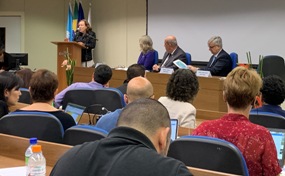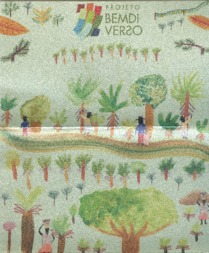Brazilian and European scientists debate the sustainable use and conservation of biodiversity
Brazilian and European scientists debate the sustainable use and conservation of biodiversity
Photo: Maria Devanir Heberlê

Cléria Inglis gives the example of Rota dos Butiazais as a success case
Advances in the knowledge exchange between Brazilian scientists and family farmers in the scope of the Bem Diverso Project, organized by the Brazilian Agricultural Research Corporation (Embrapa) in partnership with the United Nations Development Program (UNDP) to promote sustainable development and rural poverty reduction and thus contribute to improve the lives of urban and rural populations, were some of the points raised at the opening of The European and Brazilian experience in promoting the use and conservation of biodiversity, which was open on Monday (2) morning by the corporation's director of research and development, Guy de Capdeville, at the Biomas Auditorium at the institution's headquarters.
“Science wants to go to extractivist populations, populations that live in extreme poverty, and through technology enable them to gather and establish cooperatives and associations that promote sustainable development in their regions”, stated Capdeville. For the director, it is of utmost importance that a research institution like Embrapa works with poor communities in different Brazilian biomes.
The European Union Ambassador to Brazil Ignacio Ybáñez reaffirmed the organism's commitment to strategic initiatives like Bem Diverso, which promote sustainability in the planet. According to Ibañez, practices like those held by Bem Diverso – e.g. Cerrado rehabilitation, the work of extractivist workers that overcome difficulties in cooperative unions –, encourage measures to strengthen the partnership between European and Brazilian institutions, especially Embrapa.
The ambassador stated that, considering the EU community's concern with biodiversity losses at a global level, this partnership needs to move forward, especially in light of the importance of meeting the targets of the European Green Deal, for which the main challenge is to become the first continent to be carbon neutral by 2050. The European Green Deal is a new EU growth strategy and Europeans are aware that collective participation and effort are fundamental for the success of a better world.
Dialoguing with the sectors
The seminar marks the beginning of the second phase of the Sector Dialogues, promoted by the European Union, Brazilian Ministry of the Economy and Ministry of Foreign Affairs, Embrapa, UNDP and GEF (Bem Diverso project team). The goal of the event was to promote a dynamic cooperation and discussion on issues related to the sustainable use and conservation of biodiversity, based on both the European and Brazilian experience.
The first stage comprised a meeting between Embrapa researchers and their counterparts from European universities in Germany, Finland and the Netherlands, in October and November 2019, recalled the Embrapa Genetic Resources and Biotechnology researcher Aldicir Scariot, currently posted at the University of Wageningen (Netherlands) and one of the Bem Diverso leaders.
After Monday’s seminar, the delegation of European researchers will go on to visit the Alto Rio Pardo Region, in the north of the State of Minas Gerais, to check the project activities in loco.
The Bem Diverso project coordinator, Anderson Sevilha, commented that the event is an opportunity to exchange experiences and best practices held by the European research centers and the Bem Diverso team in the Amazon, Cerrado and Caatinga biomes. The expectation of the General Head of Embrapa Genetic Resources and Biotechnology Cléria Inglis is that partnership like those established through the program increasingly grow stronger, adding value to both scientific and family farmer initiatives.
About the Bem Diverso Project
Established in 2016, it aims at contributing to the conservation of Brazilian biodiversity in multiple-use landscapes through sustainable biodiversity management and agroforestry systems (AFSs), in order to safeguard the lifestyles of traditional communities and family farmers, generating income and improving quality of life. It is a partnership between Embrapa and UNDP, with funding from the Global Environment Fund (GEF), and jointly implemented with other government and civil society organizations.
Territories where action will take place
There will be six territories in the Amazon, Cerrado and Caatinga biomes: Alto Acre and Capixaba, Acre; Alto Rio Pardo, Minas Gerais; Marajó, Pará; Médio Mearim, Maranhão; Sertão de São Francisco, Bahia; and Sobral, Ceará.
Learn more about the seminar schedule here.
Translation: Mariana Medeiros
Maria Devanir Heberlê (MTb/RS 5297)
Embrapa Genetic Resources and Biotechnology
Press inquiries
deva.rodrigues@embrapa.br
Phone number: +55 61 3448-3266
Further information on the topic
Citizen Attention Service (SAC)
www.embrapa.br/contact-us/sac/

